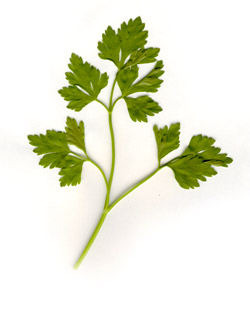Health Benefits Of Parsley

Parsley
Parsley is the world's most popular herb. Derived from the Greek word meaning "rock celery" (it's a relative to celery), parsley has been cultivated for 2,000 years, and was used medicinally long before that. Highly nutritious, it can be found year round in your local supermarket.
Health Benefits Of Parsley
Parsley has many health benefits and has been used as a cure for many ailments. It contains more vitamin C than any other standard culinary vegetable, approximately three times as much as oranges and about the same as blackcurrants. The iron content is exceptional (twice as much as spinach) and the plant is a good source of manganese, calcium and potassium. It also contains flavonoids that act as antioxidants.
Parsley is also rich in vitamin A, well-known for its effects on vision, plus can mitigate risks of atherosclerosis and diabetes.
Raw parsley cleanses the blood, dissolves sticky deposits in veins, maintains elasticity of blood vessels, facilitates removal of moderately sized kidney and gallstones, treats deafness and ear infections, and benefits the sexual system. Chewing parsley prevents bad breath!
Parsley is also good as a topical remedy for bruises. Next time you have a bruise, crush up some parsley leaves and apply straight to the affected area.
Parsley is one of the most important herbs for providing vitamins to the body. It's like an immune-enhancing multi-vitamin and mineral complex in green plant form. It grows in most climates and is readily available throughout the year.
So next time you get some parsley on your plate, eat up!








